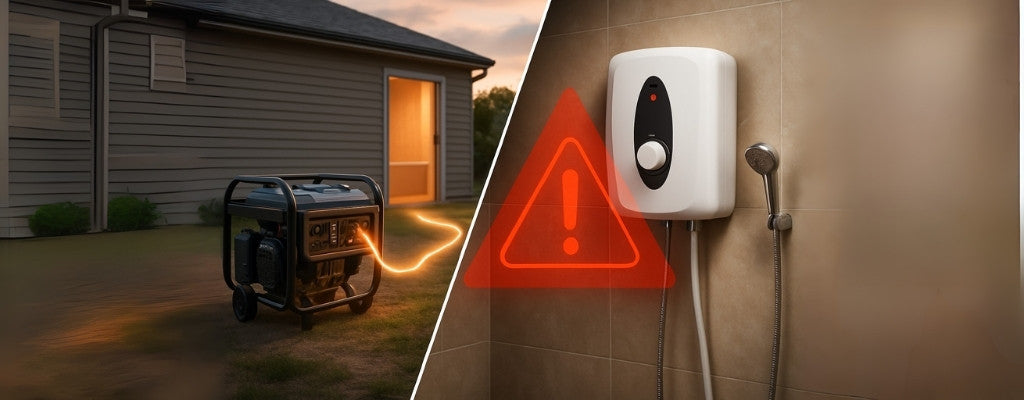
Can I Shower with a Generator?
Picture this: the power’s gone out, your generator is humming away in the backyard, and you’re desperate for a hot shower. Short answer: it’s risky—water and electricity are not mates. But with the right setup, placement, and safety measures, you can lower the dangers. Keep reading to find out how to do it properly.

What size of generator to run an electric shower?
Running an electric shower on a Generator isn’t as simple as flicking a switch. These showers are some of the most power-hungry appliances in the house. Without the right Generator size, you’ll either overload the unit or end up with nothing but cold water halfway through washing your hair.
Calculating the Wattage for Your Generator
Most electric showers use between 7,500 and 10,500 watts. That means you’ll need a heavy-duty Generator to handle the load. The trick is to check the shower’s kilowatt rating and add about 20 per cent extra for a safety buffer.
So, if your shower is rated at 8.5kW, you’re looking at a Generator of at least 10kW to keep things running smoothly. Anything smaller will struggle.
Generator Efficiency and Shower Systems
Even if your Generator is big enough on paper, you still need to think about efficiency. Old fuel, poor maintenance, or a bad setup can cut the output.
That’s why many households steer clear of running electric showers on generators altogether. Instead, they lean on gas, solar, or storage-tank systems, which are far easier to manage in a blackout.

Can I shower with a generator without electricity?
When the mains are down and you’re relying purely on your Generator, things get a bit more complicated. You can still have a shower, but it depends on the type of hot water system you’ve got at home.
The Generator's Role with a Water Heater
A Generator doesn’t always need to power the whole shower system. For example, a gas water heater may only need a tiny bit of electricity for ignition or a fan. Even a small portable Generator can usually handle that.
This means you can still enjoy hot water without needing a massive industrial unit just to keep clean.
Understanding Different Types of Water Heaters
-
Electric showers draw huge power and usually aren’t worth the hassle unless you own a very large Generator.
-
Gas water heaters are much easier—they only need a small spark or fan, so a modest Generator is often enough.
-
Solar systems with storage tanks can often rely on stored hot water, meaning your Generator may only need to run a pump.
Knowing which system you have makes all the difference in whether a shower during a blackout is possible.

Essential Generator Safety and Setup
If you do decide to run your shower system with a Generator, safety has to come first. These machines can be dangerous if they’re not set up properly.
Proper Grounding for Your Generator
Always ground your Generator the way the manual tells you. If you’re unsure, it’s worth calling in a licensed electrician to do the setup. One small mistake with grounding can mean a nasty shock.
Preventing Carbon Monoxide Poisoning from a Generator
Never, ever run a Generator indoors, in garages, or under patios. Carbon monoxide can build up quickly and it’s deadly. Keep it outdoors in a wide, open space.
The Right Location for Your Generator
The best place is outside, away from doors, windows, and bathroom vents. Keep it dry using a canopy or a purpose-made cover. Remember—water and electricity don’t mix, especially when you’re about to jump in the shower.

Conclusion
Yes, you can shower with a Generator running, but only if your water system and Generator size match up and you’re sticking to safe practices. Electric showers usually need a massive unit to run, while gas or solar hot water systems are much more practical with smaller generators.


